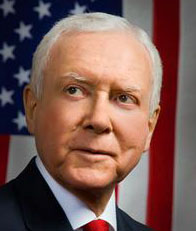This morning, Sen. Orrin Hatch spoke about international intellectual property issues at the U.S. Chamber of Commerce. He was the keynote at the organization’s launch of the second edition of its Global Intellectual Property Index. A video of the event is here, and Sen. Hatch takes the podium at 9:45.
Sen. Hatch argued that American history has shown strong intellectual property (IP) leads to prosperity. Research has shown that increased IP leads all countries to enjoy greater foreign direct investment, technology transfer and innovation. However, the “lesson is lost” in the developing world where countries try to develop through “short cuts” that “undermine” and “steal” U.S. innovation. India is the biggest battlefront, and Indian compulsory licenses based on nonworking are a big problem. Hatch warned that nothing in India’s patent laws limit compulsory licenses to pharmaceuticals, and he warned that other fields of technology such as cell phones or jets could be subject to compulsory licenses too.
Sen. Hatch thinks that the use of trade policy to promote intellectual property is very important, and he worries that the Obama Administration doesn’t “get it.” He said the Chile is out of compliance with its IP obligations under the US-Chile Free Trade Agreement (he did not specify the violation), but the Administration won’t initiate dispute settlement under the FTA. The Administration will initiate disputes over labor (for instance, in Guatemala), but it will not initiate disputes over IP.
He also criticized the Administration for allowing the Korea-US Free Trade Agreement to take effect before the Korea was fully compliant with the pharmaceutical chapter, which relates to pricing and reimbursement of health innovations.
Sen. Hatch discussed the Trade Promotion Authority (TPA) bill he recently introduced with Sen. Baucus, which requires the strengthening of IP to be a key objective in trade negotiations. This includes enforcement of TRIPS, the end of government involvement in IP theft, and certain online protections. It also calls for the elimination of price controls and transparency in reimbursement schemes. Finally, the bill directs the US to work with trade partners to help them strengthen their IP laws. Sen. Hatch did not sound enthusiastic about the state of the legislation in Congress. He noted opposition in Congress and said he was “underwhelmed” by the administration’s attempts to push TPA forward. He warned that if Congress doesn’t pass the legislation, the Administration’s ability to negotiate high standard agreements “will be greatly diminished.”
Sen. Hatch said that the U.S. is hesitant to push for adequate IP protection in the Trans Pacific Partnership (TPP) negotiations, and he worries that this will “undermine standards on intellectual property.” Most observers would say that the US is pushing for stronger IP terms than any of the other parties. (The latest-leaked text, with country negotiating positions is here, analyses of the text are here, and Gabriel Michael’s visual displays of how different the US is from the rest of the negotiating parties are here.)
However, Sen. Hatch thinks the U.S. should push harder for uniformly stronger protections in the TPP. He criticized the news that negotiators are considering language that would allow developing countries to phase in their TPP obligations based on their individual “circumstances,” and he noted that it is unclear exactly how it would work in practice. He emphasized that he wants the TPP to include a 12 year period of data exclusivity for biologic medicines in the final text. He also noted with concern reports that the TPP rules on pharmaceutical pricing and reimbursement will be less strong than those found in the Korea-US FTA.
Sen. Hatch warned there is a serious question whether the U.S. will “even pursue” an IP chapter in the Transatlantic Trade and Investment Partnership. He worries that leaving IP out of this trade agreement would set a bad precedent for future agreements with other countries.
At the end of the talk, he thanked the Chamber of Commerce for the invitation to speak, and said that when it comes to working for stronger IP, the Chamber will “never have a bigger supporter than this old boy here.”





